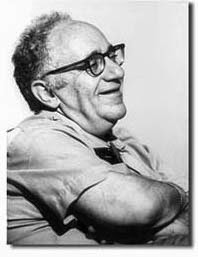Anarcho capitalism is impossible?
The anarcho-capitalist viewpoint it simple. Aggression is wrong. Theft is wrong. Property rights exist and the state should not. While the development of this philosophy was thousands of years in the making and traced a tortured route through early Chinese and Greek philosophers, past the early Christian church, onto the liberal reaction against Absolutism in Europe in the 17th and 18th century and finally culminating in the social views of the Austrian school in North America it's basic axioms are elegant in their simplicity.
The anarcho-syndicalist viewpoint is equally simple but mired in contradictions. Capitalism is evil. Property is theft. The state should not exist. But if there is no state then who is to oversee the common store of goods? Who is to determine if one is shirking or doing one's fair share? Necessarily a workers council must control the commonly owned property; behold the state. If property is theft, what then about personal possessions? Can I not own a toothbrush of my own? Clothing of my own? Behold, private property.
Syndicalism also suffers from a calculation deficit. Without a price system derived from economic calculation, how is it determined how much iron or buttons or widgets are produced? While the solution of state communism to this problem is woefully inadequate, they at least attempt such a solution. Sowell estimates the Soviet Union had 34 million different prices to be set. How can a syndicalist society determine what should be produced without these prices? The price system effortlessly coordinates the activities of people across the globe to produce that which is most urgently desired by consumers. Without it, how are you to prevent or correct a glut in good A or a shortage in good B?
The question of national defense in a society without a state is an important one. How precisely would the threat of foreign invasion be handled? Perhaps an army would be organized in peacetime on the basis of a charity, with broad reservist ranks and voluntary donations for funding. Perhaps nuclear weaponry would be obtained and used to threaten bellicose neighbours (although given that A's aggression against B does not justify B's aggression against C it is difficult to reconcile a libertarian ideology with the use of a nuke). Perhaps diplomacy and luck (friendly neighbours) would do the trick, as in the case of say a North American or European anarcho-capitalist nation. Ultimately we can offer only conjecture as to how the demand for national security would work. But an anarcho-capitalist nation would have certain advantages when it came to national defense. A policy of open borders would attract immigrants and a larger population base will allow for a larger army. Laissez-faire has proven historically to lead to rapid capital accumulation and a strong industrial base can be converted into the production of armaments. Free market capitalism contributes to the rapid development of new technology and so, certeris paribus, a libertarian society would be a more advanced society, and this will translate into a more advanced military. One thing can be certain, the rapidly disintegrating economic structure of a anarcho-socialist state would leave such a nation in very poor shape to handle foreign conquerors.
People would still be able to get obscenely rich without a state; the main difference would be that fortunes could only be made by providing consumers with what they most urgently desire. The state is systematic plunder; the market is peaceful social cooperation. While government is justified on the basis of security and protecting private property in reality it is simply a criminal conspiracy on the part of the political class to loot the economic class. Far from protecting private property the state constantly aggresses against it. It would be far easier for the greatest entrepreneurs to accumulate wealth if they did not have to submit constantly to state plunder and jump through bureaucratic hoops. But laissez-faire means prosperity not only for the elite but also for everyone else. Historically societies which have most closely approximated laissez-faire have also seen standards of living rise very quickly for everyone, including the poorest of the poor. Without the state to seize and redistribute a significant portion of the national product there would be a far greater investment in capital. Without the government's mangling of the money supply it would be far easier for people to save, meaning a greater supply of loanable funds for enterprise to borrow and grow. A sound monetary system would mean an end to the boom-bust business cycle and the constant dislocation brought about by artificial interest rates. Without a bellicose foreign policy there would be more resources for domestic production. Without the regulatory regime free enterprise would more easily flourish. Everything the state does retards innovation, suppresses economic growth and leads to poverty. How can one imagine that the cost of private policing could be anything comparable to the taxes demanded by the modern omnipotent state?
The state, the organization of the political means, is a monster. The state is violence. But abolishing this institution of evil and replacing it with socialism would be jumping out of the frying pan and into the fire. There have been countless experiments in the 'common store' of goods, all of them ending in abject failure, misery, poverty and tyranny. History is replete with the graves of those who have been victimized by this idea. The state is evil; capitalism is great.

No comments:
Post a Comment